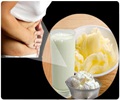When Mao Zedong and Deng Xiaoping were in power, milk products were unknown in China. It was only when the country opened up to outside world that diary products began appearing in the market.
Westerners visiting China 20 or 30 years ago were hard pressed to find dairy products, and were only able to drink yoghurt out of a straw from a stone pot carved with Chinese characters, still available in the country.But in the past few years, supermarket shelves have filled up with powdered or traditional milk, yoghurts and milk drinks, in countless cartons and cans, along with all sorts of flavours.
The average Chinese person, who drank 1.2 kilogrammes (2.6 pounds) of milk a year in 1980 when Deng -- the architect of China's reforms -- was in power, guzzled 26.7 kilos last year, according to the national bureau of statistics.
This, however, is still 10 times less than what people in developed countries consume.
"Milk has certainly substituted some of the traditional drinks, such as porridge, soybean milk and noodle soup," said You Xiuzhen, a retired woman shopping at the Wonderful Supermarket in Beijing.
In the early 1980s, Chinese people in big cities were the first to begin buying dairy products, and purchasing a litre of milk was almost a sign of wealth or extravagance.
Advertisement
"Thirty years ago, adults would not drink milk because we did not have the extra money for something that was not deemed necessary," said Li Jinxia, another retired woman in Beijing.
Advertisement
Despite a widespread lactose intolerance in China, milk sales increased by 128 percent over the past five years, and those of powdered baby milk rose 185 percent, according to Euromonitor International.
"The fastest growth was during 2002 and 2004, with annual growth of more than 20 percent," said Yang Fan, an economist at the market research company, in Shanghai.
"The dairy industry has been growing unusually fast in China with government support -- China's growth model is unique."
In 2006, China's Prime Minister Wen Jiabao declared: "I have a dream that every Chinese, first of all children, can afford to drink one kilogramme of milk every day."
Then, Mengniu, one of the industry's heavyweights currently under the spotlight, launched a campaign donating milk in rural areas with the help of government agencies.
It used the slogan: "A litre of milk a day makes the Chinese people stronger."
After decades of communist isolation, China's opening to the outside world also helped drive dairy product consumption.
"The mass media is exposing many of China's households to foreign ideas, products and lifestyles without citizens having to travel abroad," a 2005 study on Chinese dairy products by Iowa State University said.
As for powdered milk, which has killed four children in China during the current scandal, advertising campaigns on the health benefits proved extremely effective.
In Shanghai, 50 percent of women now feed their babies with powdered milk -- Chinese kids are not consuming rice soup or soya porridge anymore and often have powdered milk well beyond their first birthday.
Meanwhile, in towns and cities, modern, urban women see powdered milk as a way to get their figure back fast after giving birth, indicating the current crisis is unlikely to dent China's new-found enthusiasm for dairy products.
Source-AFP
RAS/SK















